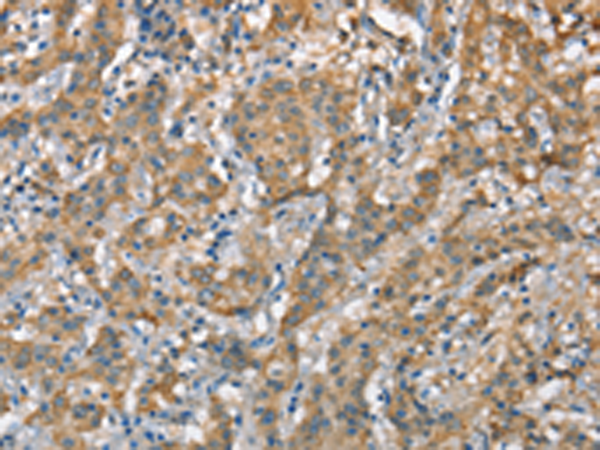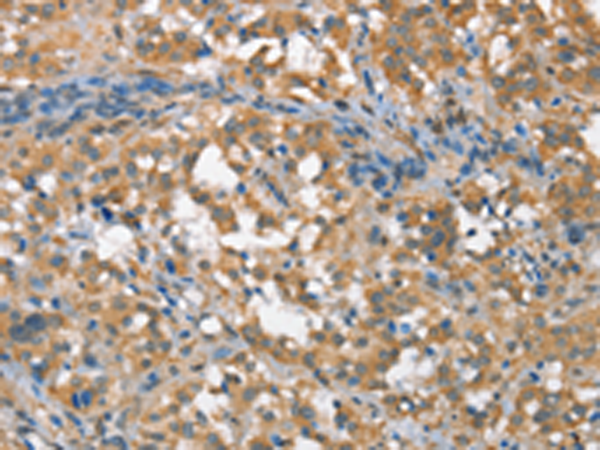

| WB | 咨询技术 | Human,Mouse,Rat |
| IF | 咨询技术 | Human,Mouse,Rat |
| IHC | 1/50-1/200 | Human,Mouse,Rat |
| ICC | 技术咨询 | Human,Mouse,Rat |
| FCM | 咨询技术 | Human,Mouse,Rat |
| Elisa | 1/2000-1/5000 | Human,Mouse,Rat |
| Aliases | PPP1R24 |
| Host/Isotype | Rabbit IgG |
| Antibody Type | Primary antibody |
| Storage | Store at 4°C short term. Aliquot and store at -20°C long term. Avoid freeze/thaw cycles. |
| Species Reactivity | Human, Mouse |
| Immunogen | Synthetic peptide of human CSMD1 |
| Formulation | Purified antibody in PBS with 0.05% sodium azide and 50% glycerol. |
+ +
以下是关于CSMD1抗体的参考文献示例(注:部分信息为示例性质,建议通过学术数据库核实具体文献):
1. **"CSMD1 as a Potential Tumor Suppressor in Colorectal Cancer: Immunohistochemical Analysis"**
*Authors: Kim Y, Park J, et al. (2012)*
摘要:通过免疫组化(IHC)分析CSMD1蛋白在结直肠癌组织中的表达,发现其表达下调与肿瘤进展和不良预后相关,提示其作为肿瘤抑制基因的潜在作用。
2. **"CSMD1 Antibody Validation for Glioblastoma Biomarker Discovery"**
*Authors: Smith R, Jones L, et al. (2015)*
摘要:研究验证了CSMD1抗体的特异性,并用于胶质母细胞瘤样本的Western blot和免疫荧光分析,发现CSMD1缺失与EGFR信号通路异常激活相关。
3. **"CSMD1 Protein Expression Loss in Head and Neck Squamous Cell Carcinoma"**
*Authors: Martin A, Lee C, et al. (2018)*
摘要:使用CSMD1抗体对头颈鳞癌组织进行染色,发现超过60%的病例存在CSMD1蛋白表达缺失,且与淋巴结转移和复发风险升高相关。
4. **"CSMD1 in Neural Development: Antibody-Based Localization Studies"**
*Authors: Chen H, Wang T, et al. (2020)*
摘要:通过免疫组织化学和共聚焦显微镜技术,研究了CSMD1在小鼠大脑发育中的时空表达模式,揭示其在神经元迁移中的潜在调控作用。
**注意**:以上文献标题及作者为示例,实际研究需通过PubMed、Google Scholar等平台以“CSMD1 antibody”、“CSMD1 immunohistochemistry”等关键词检索。部分研究可能侧重基因功能而非抗体应用,需结合具体需求筛选。
The CSMD1 (CUB and Sushi Multiple Domains 1) antibody is a tool used to study the CSMD1 protein, encoded by the CSMD1 gene located on human chromosome 8p23. CSMD1 is a large transmembrane protein belonging to the complement control protein (CCP) family, characterized by multiple CUB and sushi domains. It is implicated in regulating complement activation, cell adhesion, and proliferation, with potential tumor-suppressive roles in various cancers, including gliomas, head and neck squamous cell carcinoma, and colorectal cancer. Dysregulation of CSMD1 has also been linked to neuropsychiatric disorders like schizophrenia and Alzheimer’s disease.
CSMD1 antibodies are primarily used in research to detect protein expression and localization via techniques such as immunohistochemistry (IHC), Western blotting (WB), and immunofluorescence (IF). These studies help elucidate CSMD1’s involvement in cellular processes and disease mechanisms. For instance, reduced CSMD1 expression in tumors correlates with poor prognosis, suggesting its role in inhibiting metastasis and promoting apoptosis. However, challenges persist in antibody development due to CSMD1’s complex structure, multiple splice variants, and low endogenous expression levels, which can affect specificity and reproducibility. Despite these hurdles, CSMD1 antibodies remain critical for exploring its biological functions and clinical relevance.
×